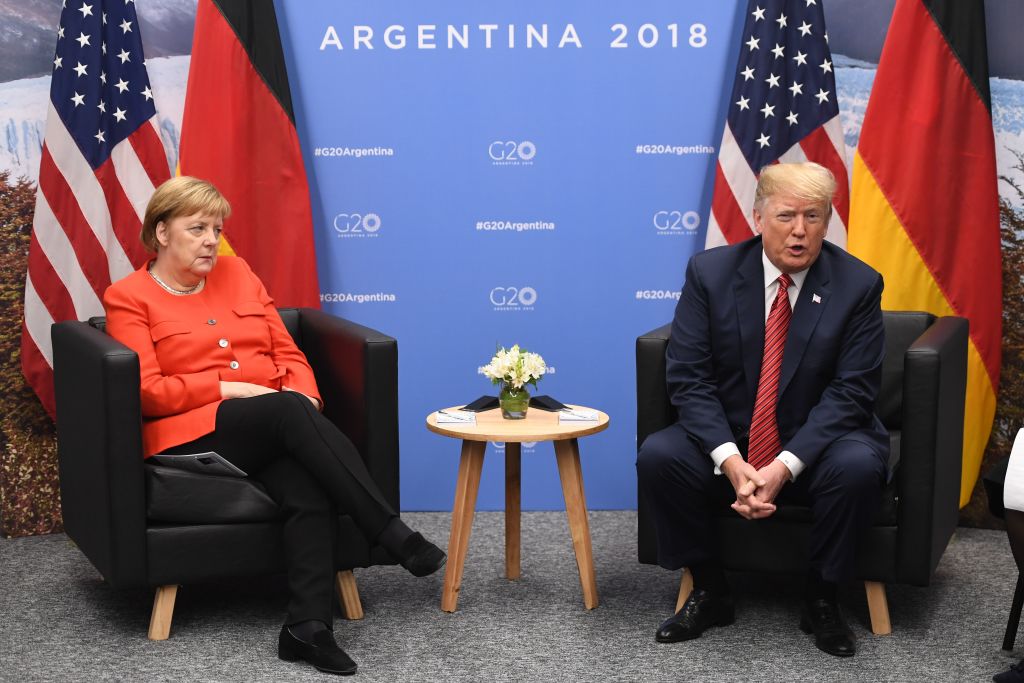For Angela Merkel, the chief guardian of Europe’s centrist politics, 2018 was a year of tribulation – and she admits it. In her New Year’s speech, the German chancellor acknowledged the hardship of the last twelve months while begging her countrymen to unite in the year ahead. “We will only master the challenges of our times if we stick together and collaborate with others across borders,” Merkel told the German people in what can only viewed as a call for the country to come together. Merkel’s words, however, don’t only apply to Germany. Europe as a whole is entering 2019 with many people agnostic about the European Union, exhausted with the familiar politicians, and more curious about the continent-wide EU parliamentary elections just around the corner. If 2018 was a year of the ascendant populists, 2019 could be a year of the establishment comeback.
Or it could be more of the same. What can we expect in European politics this year? In his Spectator cover piece this week, Fredrik Erixon says that a populist surge in the May 2019 elections could change the face of the EU forever. He’s right – and here are some of the themes likely to prove decisive in the upcoming vote.
First, migration will continue to be on the minds and lips of European politicians. While the number of illegal migrants crossing the Mediterranean into the EU is exponentially lower than its 2015 peak, migration still remains at the forefront of the continent’s political debates due in large measure to the populists’ insistence that Europe is still at the mercy of uncontrolled immigration. Right and left-of-centre politicians will disregard all of this as threat mongering and cynical political gamesmanship wholly at odds with the facts. But this matters little to Matteo Salvini, Viktor Orbán, and France’s National Rally party – all of whom will talk about the dangers of migration on an endless loop until EU voters choose their next parliament in the spring. Back in Brussels, the EU will continue searching in vain for a solution everyone can live with.
Angela Merkel, now a lame-duck politician, will use 2019 to devote more of her energy into foreign affairs. With Germany set to take a seat at the UN Security Council this year, Merkel will be more assertive on foreign relations than many of us are used to. We may even see the Germans, perhaps in partnership with France, introduce piecemeal reforms to a Security Council whose permanent membership hasn’t changed since its creation after World War II. While there is no chance the Security Council will vote to induct new permanent members, the Germans may try to get the ball rolling by making reform a major subject on the Council’s calendar.
But the biggest change in European politics this year will be at the supranational-level. With EU parliamentary elections in a few months time, nationalists have their best opportunity to solidly into a bloc and impact the business of an institution they despise.
In a report for the Carnegie Endowment last month, Stefan Lehne and Heather Grabbe discussed a scenario whereby the large EU party blocks that traditionally dominate affairs in Brussels are challenged by upstart, informal parties to the left and right clambering for influence. If nationalist MPs pick up enough seats, the European People’s Party and Progressive Alliance may see their agendas blocked. Brussels could prove to more unproductive in 2019 than it was last year, adding even more pessimism on the streets that the EU project is not serving their interests.
US-EU relations may also be rockier. The 2020 US presidential campaign season will pick up, which means president Donald Trump will assault the usual suspects – Nato, the EU, Merkel – to show his political base that he is as tough on those elitist Europeans as he has always been. In fact, Trump has wasted no time on this score in the early days of the new year. Jabbering for over 90 minutes in the cabinet room yesterday, Trump faulted Berlin for weak defence spending and scoffed at the notion he should be concerned about his popularity in Europe. “I don’t care about Europe,” the president said. “I’m not elected by Europeans, I’m elected by American taxpayers, frankly.”
Yet after two years of walking on eggshells, the EU will no longer be as diplomatic in response. We can anticipate the likes of Donald Tusk, Federica Mogherini, and outgoing EU commission president Jean-Claude Juncker to lash out with more Trumpian flourish. Unfortunately, the counterattack will only play to the advantage of Trump and his fellow populists, who relish a brawl and have seen public fights with the representatives of mainstream politics result in poll increases. Europe’s turbulent politics – as well as the rocky relationship between the EU and the US – looks set to continue in 2019.






Comments